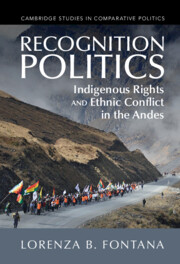Book contents
- Recognition Politics
- Cambridge Studies in Comparative Politics
- Recognition Politics
- Copyright page
- Dedication
- Contents
- Figures
- Tables
- Acknowledgements
- Acronyms and Abbreviations
- Introduction
- 1 Recognition Conflicts
- 2 Citizenship and Development in the Andes
- 3 Class and Ethnic Shifts
- 4 Recognition for Whom?
- 5 The Physical Boundaries of Identity
- 6 Unsettled Demographies
- 7 Struggles for Inclusion and Exclusion
- 8 Rethinking Recognition: What Are the Implications for Identity Governance?
- References
- Index
- Other Books in the Series (continued from page ii)
4 - Recognition for Whom?
Published online by Cambridge University Press: 05 January 2023
- Recognition Politics
- Cambridge Studies in Comparative Politics
- Recognition Politics
- Copyright page
- Dedication
- Contents
- Figures
- Tables
- Acknowledgements
- Acronyms and Abbreviations
- Introduction
- 1 Recognition Conflicts
- 2 Citizenship and Development in the Andes
- 3 Class and Ethnic Shifts
- 4 Recognition for Whom?
- 5 The Physical Boundaries of Identity
- 6 Unsettled Demographies
- 7 Struggles for Inclusion and Exclusion
- 8 Rethinking Recognition: What Are the Implications for Identity Governance?
- References
- Index
- Other Books in the Series (continued from page ii)
Summary
In this chapter, I compare national debates around the definition of the collective subject that should be granted access to a new participatory mechanism for development and resource governance called Free Prior and Informed Consent/Consultation (FPIC). This is an interesting case, I argue, around which to discuss a type of recognition conflict that I call participation conflict. These conflicts result from the implementation of means of recognition (through categorisation exercises) in contexts where opportunities to control new strategic resources are pursued by traditionally marginalised social actors. Regulated by ILO Convention 169 and included in most Latin American legal frameworks since the 1990s, in recent years, FPIC has suddenly catalysed the attention of both governments and social movements. FPIC aims at achieving more effective bottom-up participation by establishing an obligation to consult – or obtain the consent of – indigenous peoples before large development projects and legal reforms that would affect them can proceed. Given its relevance for natural resource governance, interest in FPIC initiatives has been growing, particularly in the framework of political economy models that increasingly rely on commodity exploitation to sustain economic growth and welfare investments. The Andean region has been pioneering the implementation of FPIC worldwide. Here is where the most advanced legislation and institutionalisation processes in regard to FPIC have developed over the past decade. However, these advances have not occurred without tensions. Heated disputes on the definition of the collective subject that should be granted this new right have led to very different outcomes in Bolivia, Colombia and Peru. Some crucial knots in this discussion have revolved around how to operationalise the distinction between ethnic and non-ethnic communities and, notably, whether or not peasant communities should be entitled to FPIC. This represents, therefore, a telling example of an ethnic boundary-making exercise (a classic ‘means of recognition’) with important implications for groups’ self-perception and mutual relationships. The different answers offered by the three countries to the subject question not only have important implications in terms of the inclusion and exclusion of considerable parts of the rural population from new mechanisms of participatory governance; they also reflect the models of citizenship and development that these countries are committed to building through the redefinition of identity articulation/disarticulation processes and delimitation of social boundaries.1
Keywords
- Type
- Chapter
- Information
- Recognition PoliticsIndigenous Rights and Ethnic Conflict in the Andes, pp. 95 - 122Publisher: Cambridge University PressPrint publication year: 2023

